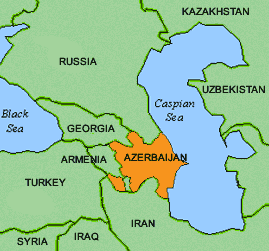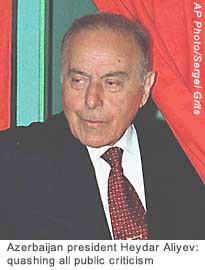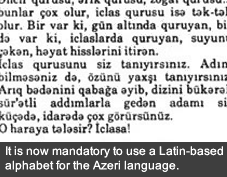In Azerbaijan, a press is only so free
|
New York, September 4, 2001–While the independent media in Azerbaijan struggle to provide information to the public, President Heydar Aliyev’s government continues to use an arsenal of questionable methods–including defamation laws, cumbersome regulations, and selective government subsidies–to quash all public criticism. Despite the president’s claims, little has changed in Azerbaijan during the 10 years since the former Soviet republic became independent. A recent government campaign against independent media outlets, combined with new regulations requiring newspapers to use the Latin alphabet rather than Cyrillic, have burdened the already struggling independent Azerbaijani press. Newspaper suspended for criticizing senior Muslim cleric This charge came in response to an article published in the July 28-August 3 edition of Etimad titled, “Isa Gambar and the Two Armenians,” which contained pejorative comments about Pashazade. In an August 13 television address, President Heydar Aliyev condemned the article and called for sanctions against the newspaper. “In connection with this article, we have received hundreds of letters….in all these letters, people express their outrage at such an incident and ask me, the president of Azerbaijan, to punish the newspaper that insulted Azerbaijan’s religious leader, Sheikh ul-Islam. I agree with all these thoughts,” the president declared. Etimad plans to continue publishing while it considers appealing the ruling, Journalists’ Trade Union founder and chairman Azer Hasret told CPJ. The defamation charge came in reprisal for an article in the July 22-28 edition of Milletin Sesi titled, “Who Testified Against Heydar Aliyev?” The article accused Nasibov and Nuriyev of financial misconduct in a privatization deal, the Turan news agency reported. These allegations had already appeared in numerous international publications, including Forbes, The New York Times, and the Russian newspaper Kommersant-Den’gi, the Moscow-based Center for Journalism in Extreme Situations (CJES) reported. According to Azerbaijan’s Law on Mass Media, media outlets are not responsible for information republished from other media sources. The court ignored 126 pages of articles that were submitted to support Milletin Sesi‘s allegations against Nasibov and Nuriyev. Milletin Sesi editor Shahbaz Huduoglu told CJES that he plans to appeal the ruling, which takes effect in one month, to the Supreme Court if necessary. He added that Milletin Sesi will continue publishing until all legal recourses have been exhausted. The decree was intended to reduce the dominance of the Russian language in Azerbaijan. Josef Stalin imposed the Cyrillic script, which is derived from Russian, on Azerbaijan in 1939. Since then, most Azeri-language newspapers in the country have been printed in Cyrillic. The circulation of some newspapers and magazines has dropped since the June decree because many middle-aged and older readers are not accustomed to the Latin script. The drop in circulation has hurt independent publications, which rely heavily on newsstand sales to survive government harassment and poor economic conditions. State publications and private media that back the government, on the other hand, have been cushioned by government subsidies and other financial favors. However, many younger readers are adjusting more easily to the change because they learned the Latin alphabet in school, according to Hasret. As a result, some newspapers geared toward younger audiences may see their circulation rise due to the June decree. One independent weekly tried to defy the decree and continue publishing in Cyrillic. But the August 9 edition of Impul’s never appeared on newsstands because the government pressured the paper’s printing house to block the issue. Officials summoned Impul’s owner, Xan Husseyn Aliyev, to the Baku prosecutor’s office and gave him an official warning for violating the regulation. The newspaper has since ceased publication. Alex Lupis is the Europe and Central Asia program coordinator for CPJ. Olga Tarasov is the Europe and Central Asia researcher. |

 Punished for exposing dubious government deal
Punished for exposing dubious government deal